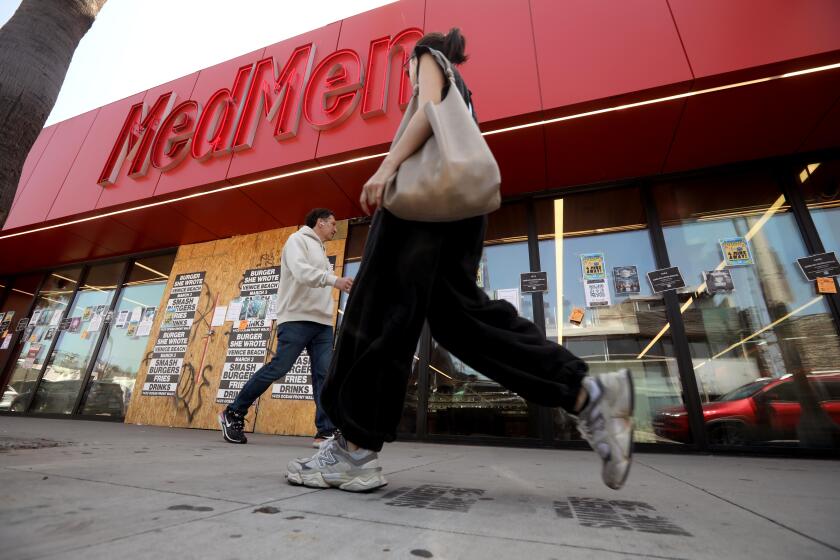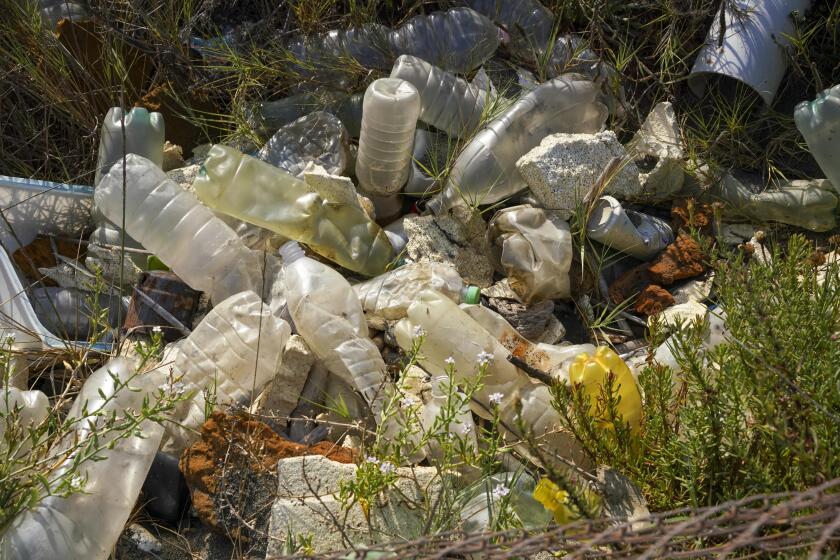DEA’s big marijuana shift could be a lifeline for California’s troubled pot industry

- Share via
If the U.S. Drug Enforcement Administration reclassified marijuana as a less dangerous drug, it wouldn’t eliminate the conflicts between the feds and states such as California that have legalized many uses of the substance.
But it would bring one significant shift that could give California’s licensed pot companies a badly needed boost: a lighter tax burden.
The Associated Press reported Tuesday that the Drug Enforcement Administration will propose moving marijuana from the list of Schedule I drugs, which includes heroin and cocaine, to Schedule III drugs, which include ketamine and anabolic steroids. The proposal would still have to be reviewed and endorsed by the White House as well as be made available for public comment.
Industry insiders say the move, if approved, could become a lifeline to California’s struggling cannabis industry. “We’ve been anticipating this,” said Meital Manzuri, an attorney whose firm specializes in the cannabis industry. “This is big for the industry.”
Lawful in California but illegal under federal law, the state’s cannabis industry has operated in a difficult legal limbo. Stores and farms operate in the open, but they’re cut off from benefits that other businesses enjoy, such as access to out-of-state markets.
The U.S. Drug Enforcement Administration will move to reclassify marijuana as a less dangerous drug, a historic shift to generations of American drug policy.
Their murky legal standing has also meant that banking, credit card processing, insurance and other vital business services are out of reach for many marijuana businesses.
The tax burden, though, has been particularly onerous. Section 280E of the federal tax code bars businesses involved in “trafficking” of Schedule I or II substances from deducting the expenses they incur. As a result, they are taxed on every dollar they collect, not just their profits.
But if marijuana is reclassified as a Schedule III drug, “players in that industry for the first time will be able to take standard tax deductions that other businesses take,” said Paul Armentano, deputy director of the National Organization for the Reform of Marijuana Laws, also known as NORML, which advocates for cannabis consumers. “The biggest change is going to be how the industry does business.”
“The industry in California especially has been faltering in the last couple of years and this offers them a future,” Manzuri said. “It might be a lifeline that they need to continue operating.”
According to the California Department of Tax and Fee Administration, legal marijuana shops reported about $5.1 billion in revenue in 2023, less than the previous year and 11% less than in 2021.
For years, licensed businesses have struggled to compete with a burgeoning black market that, while avoiding licensing, fees and taxes, can sell its wares at a fraction of the price charged by legal outfits.
But Armentano hopes those in the industry don’t “jump the gun” and that, if marijuana is reclassified, it may still take some time for changes to become tangible.
If cannabis is reclassified, he said, it would nevertheless remain illegal under federal law for recreational uses. States that have legalized marijuana, he said, don’t operate under the federal standards.
Once hailed as the Apple store of cannabis, MedMen has shuttered many of its locations. What does that say about shopping for pot in California?
Thirty-seven states have legalized cannabis for medicinal use, seven others have legalized CBD oil for medicinal use and 24 states have legalized cannabis for recreational use, according to DISA Global Solutions, a company that administers drug tests.
Some organizations that oppose marijuana legalization, including Smart Approaches to Marijuana, have announced their intent to challenge the final rescheduling decision.
“Crude marijuana has never passed safety and efficacy protocols,” said Dr. Kevin Sabet, president of Smart Approaches to Marijuana, calling it a political decision in an election year. “Politics and industry influence have loomed over this decision from the very beginning.”
If the reclassification is ultimately approved, it would recognize medicinal uses for marijuana and require the drug be sold and regulated on the federal level similar to how ketamine, some anabolic steroids and Tylenol with codeine are regulated. Products would need federal approval — which no cannabis product currently has.
“The majority of the states regulate cannabis in a way that’s inconsistent with federal law,” Armentano said.
That means other financial benefits, such as banking and insurance, would still be out of reach for many businesses, Manzuri said, especially for dispensaries that operate for recreational use.
That has remained an ongoing issue for dispensaries, which typically operate as cash-only businesses. Many of them are unable to obtain banking services for what has grown to be a billion-dollar industry, although the California Department of Cannabis Control has sought to help marijuana businesses set up bank accounts.
In California, where the herbal substance kratom has become a common fixture in vape-and-smoke shops, lawmakers are now aiming to reel in an unregulated market.
The major credit card companies, though, won’t process marijuana-related payments, and reclassifying the drug to Schedule III wouldn’t change this, experts said.
“The payments industry only processes legal products, and reclassification does not make cannabis legal,” said Scott Talbott, executive vice president of the Electronic Transactions Assn. “Reclassification moves the needle but doesn’t cross the goal line to making cannabis legal and thus acceptable to banks and the credit and debit card industry.”
Yet reclassifying could help address some of the stigma that has been associated with marijuana and the cannabis business, Armentano said. It will be part of a long process, especially for a service as important to the industry as banking.
“My presumption is that marijuana could be made legal tomorrow, and your Chases, JP Morgans, and Wells Fargos would still say, at least at first, that it doesn’t change our bottom line,” Armentano said.
But those who have been navigating the legal waters of the weed industry still welcome the potential benefits of reclassification.
“Rescheduling won’t legalize cannabis or let a doctor prescribe it, but it will allow existing marijuana companies to be taxed like any other business — essentially a huge investment in the overall sector by the way of tax relief,” said Adam Terry, chief executive of Cantrip, a THC-infused drink company based in Massachusetts. “[Reclassification] improves the overall economic health of the industry and continues to inch towards legitimization in the eyes of the public.”
The state auctioned off 10 dispensaries’ TVs and furniture as well as water pipes and bongs. It didn’t make much of a dent in the taxes they owed.
“The California cannabis industry needs that right now,” said Amy Jenkins, legislative advocate for the California Cannabis Industry Assn. “The industry has a significant number of challenges with our existing taxation framework.”
Whitney Economics, a cannabis-focused research company, estimated last year that legal cannabis operators in the U.S. overpaid more than $1.8 billion in taxes in 2022 when compared with other businesses.
Reclassification, Jenkins said, “would provide greater stability to the legal cannabis industry.”
It could also allow more entities to conduct research, possibly opening the doors to industry innovation and greater medicinal benefits. “No one has been able to research it on a wide scale for a long time,” Manzuri said.
For Armentano, whose organization wants states to be allowed to regulate marijuana the way they can regulate alcohol, the possibility of reclassification doesn’t go far enough.
“It’s going to be a very long time after the fact before regulators at the FDA and DEA and other agencies acknowledge that this change isn’t sufficient,” he said.
More to Read
Sign up for Essential California
The most important California stories and recommendations in your inbox every morning.
You may occasionally receive promotional content from the Los Angeles Times.















